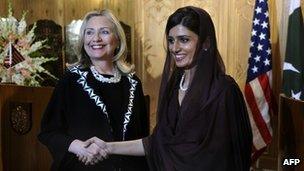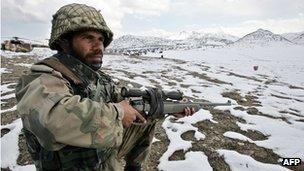Clinton urges Pakistan to take action against militants
- Published

Hillary Clinton and her delegation are meeting top political leaders as well as senior military figures
US Secretary of State Hillary Clinton has called on Pakistan to take "strong steps" to deny Afghan insurgents sanctuary on its soil.
Speaking in Islamabad after talks with Foreign Minister Hina Rabbani Khar, she also urged Pakistan to encourage the Taliban to enter talks "in good faith".
Ms Khar admitted Pakistan could do more to stop militants from operating within its borders.
Relations between the US and Pakistan are at their lowest point for a decade.
Mrs Clinton is delivering a blunt message that Pakistan must step up its counter-terror efforts.
After months of tension, she is heading a high-powered delegation that includes CIA chief David Petraeus and the new Chairman of the Joint Chiefs of Staff, Gen Martin Dempsey.
They are meeting senior military staff as well as top political leaders.
Speaking in Kabul on Thursday, Mrs Clinton called for a new partnership between the US, Afghanistan and Pakistan to fight militants, who she urged to pursue peace. She said Pakistan "must be part of the solution" to the Afghan conflict.
'Critical role'
For years Washington has urged Islamabad to tackle militants in tribal areas along the Afghan border - especially the Haqqani network - who have been blamed for a series of recent attacks in Afghanistan.
The verbal and military assault waged by the US against the network has intensified in recent months. Accusations from US officials that Pakistan backs the Haqqani group have put further strain on ties between the US and Pakistan, which hotly denies the claims.
Relations nosedived after US troops killed Osama Bin Laden in a covert operation on Pakistani soil in May. Analysts now detect a desire on both sides to improve the relationship but say it is too early to tell how successful the efforts will be.
Mrs Clinton insisted the US remained committed to a long-term relationship with Pakistan, saying it "has a critical role in supporting Afghanistan reconciliation and ending the conflict".
But she called for action against militants "over the next days and weeks, not months and years".

Pakistan has sent thousands of troops to the Afghan border area
Doing so, she said, was in the interests of Pakistan, where thousands have died in militant violence in recent years.
"You can't keep snakes in your backyard and expect them only to bite your neighbours," Mrs Clinton said.
"We asked very specifically for greater co-operation from the Pakistani side to squeeze the Haqqani network and other terrorists... trying to eliminate terrorists and safe havens on one side of the border is not going to work," Mrs Clinton told a joint news conference in Islamabad.
"It's not just military action. There is greater sharing of intelligence so we can prevent and intercept the efforts by the Haqqanis or the Taliban to try to cross the border or to plan an attack."
Pakistan's foreign minister appeared to commit to doing more.
"Do safe havens exist? Yes, they do exist both sides," Ms Khar said. "Do we need to co-operate? Yes. We can co-operate more and achieve better results."
However, it is not clear whether Pakistan's powerful military is ready to do more to help the Americans.
Hillary Clinton: "The Pakistanis have a role to play, they can either be helpful, indifferent or harmful and we are hoping that we can convince them to be helpful in our efforts."
On Wednesday the country's army chief signalled again that Pakistani forces would not be rushed into any crackdown in North Waziristan.
Gen Ashfaq Kayani said Washington should focus on stabilising Afghanistan instead of pushing Pakistan to attack militant groups in the crucial border region.
The BBC's Orla Guerin in Islamabad says Pakistan sees the Haqqanis as old allies who could protect its interests in the future Afghanistan - and it will not take them on at a time when America prepares its exit from the region in 2014.
Both the US and Pakistani governments had close ties with the group's founder, Jalaluddin Haqqani, during the war against Soviet troops in Afghanistan in the 1980s.